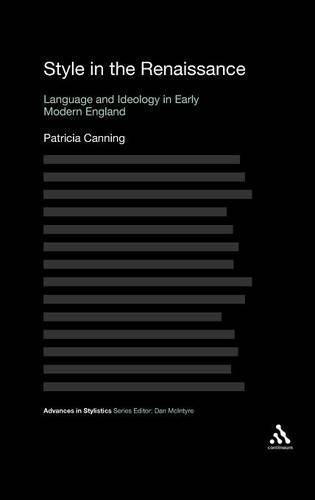
Style in the Renaissance: Language and Ideology in Early Modern England
(Hardback)
Available Formats
Publishing Details
Style in the Renaissance: Language and Ideology in Early Modern England
By (Author) Dr Patricia Canning
Continuum Publishing Corporation
Continuum Publishing Corporation
24th May 2012
United States
Classifications
Tertiary Education
Non Fiction
Literary studies: general
427.00903
Physical Properties
Hardback
224
Width 156mm, Height 234mm
Description
In a book which brings together language, text and context, Patricia Canning synthesizes models of contemporary stylistics with both critical and literary-historical theory. In doing so, the author maintains a specific and sustained stylistic focus on the religious, political and ideological issues that animated and defined Reformation England. Each chapter interrogates the dichotomous concept of 'word' and 'image' by considering the ways in which writers of this period deal with these contentious subjects in their dramatic and poetic works.'Representation', Canning argues, 'is not just as a matter of semiotics but of ideology'. Whereas stylistics enjoys extensive application in the analysis of contemporary texts, it has, until now, been markedly under-used in the exploration of the historical literary genre. Addressing this shortcoming squarely and robustly, Canning's book is a showcase for the stylistic method. Among its many insights, this book shows how stylistics can enrich our understanding and critical interpretation of a particular literary genre in its ideological and historical context.
Reviews
Patricia Canning's adventurous interdisciplinary study brings together in new and exciting ways the two fields of linguistics and literary criticism in her examination of selected texts by Shakespeare and his contemporaries. The range and detail of her analysis, evident especially in her microscopic examination of linguistic forms, cultural assumptions, and historical contexts in plays by Shakespeare and Middleton, and in the poetry of George Crashaw, is impressive. Here is a rare combination of strenuous scholarly rigour, and uncompromising analysis, replete with a full and clear awareness of what interdisciplinarity involves. A welcome new voice offering unique insights into texts that we thought we knew. -- Professor John Drakakis, University of Stirling, UK
Canning's book opens new and exciting avenues for literary and stylistic investigation, while making an important contribution to the study of English Renaissance. Elegantly combining cognitive poetics focus with more traditional historically situated analysis yields a multi-faceted scholarly perspective from which scholars of many orientations can learn. The work is a model example of how the gap between linguistics and literature can be bridged for the benefit of both disciplines. -- Barbara Dancygier, University of British Columbia, Canada
Patricia Canning provides a reading of Macbeth informed by contemporary stylistics in [the chapter entitled] "A Deed Without A Name" . . . Canning patiently explains her approach as it progresses, and her methodology will be of special interest to those working in stylistics. -- Johann Gregory * The Year's Work in English Studies *
Author Bio
Patricia Canning is a Teaching Assistant at the School of English, Queen's University, Belfast, Northern Ireland. She is currently developing a 'reading for well being' project (Get Into Reading) across Northern Ireland on behalf of The Reader Organisation. She runs projects in the university as well as with female prisoners in Hydebank Prison, Belfast.
